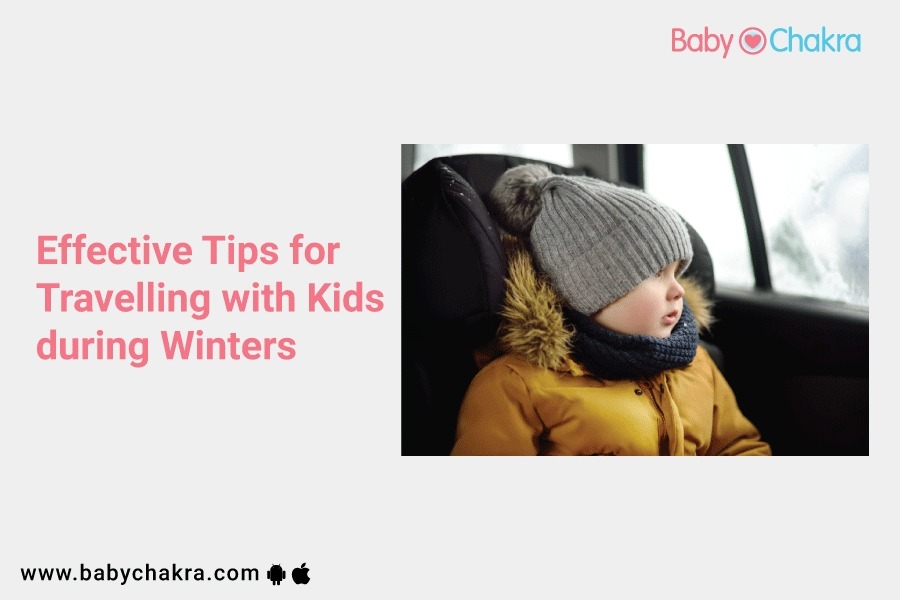
Effective Tips For Travelling With Kids During Winter
12 Nov 2021 | 4 min Read
Babychakra
Author | 1369 Articles
A vacation allows you to rejuvenate and take a break from the monotonous routine of life. It’s also a special experience for your kids, as they are exposed to new sights, food cuisines, and not to mention some memorable family time. The fun doubles up, especially, during the colder months, when the sun is warm and the air is filled with the aroma of hot chocolate and marshmallows. In fact, winter vacations with toddlers are extra-special as it allows you to rejoice and enjoy with the entire family to the fullest. However, if you are not careful with your kids during the vacation, winter can spoil your holidays.
Winter Travel Tips
You’ll will probably pack all necessary items, such as- an extra set of clothes, important documents, a first aid kit, etc for the trip. But besides these, there are a few extra essential items that you must pack while travelling with kids during winters.
To make things easier, we have compiled a list of important winter travel tips and hacks for kids that ensure you enjoy your vacation with your little ones stress-free.
1. Anti-Allergen & Decongestant
The winter season brings a hot of allergies with it. Most of these allergies during this time is caused by pollen moving in the air. Moreover, winter season also exaggerates the condition of dust allergy. Thus, to protect your kids against allergic reactions or flu, keep the bottles of anti-allergen and decongestant syrups handy. You can consult your child’s doctor regarding the dosage and the duration of the medicines before boarding for the trip.
2. Thermosteel Flask

Thermosteel flask are beneficial in keeping hot water hot and cold beverage scold for a long duration. During winter vacations with toddlers, you may find it difficult to access warm water everywhere you go. Furthermore, drinking cold water throughout the day, can make your child prone to cold and cough. Thus, keep a thermosteel flask with you to carry warm water, when you are out with your children during the trip.
3. Honey & Lemon Lozenges

Children who are not familiar with a cold environment may get infected with dry cough easily. Therefore, keep a bunch of honey and lemon lozenges handy during the trip and give them to your child if they complain of throat discomfort, or dry cough. Lozenges will help soothe your child’s throat and bring the situation under control before it becomes a full-fledged cough.
4. Instant Soup
While travelling with your kids, it’s always a good idea to keep some instant food items, such as soups to manage their sudden hunger pangs. Also, it is not always possible to search for a good restaurant everywhere, hence, it is functional to have these instant soup packets to satiate your little ones and keep them full. Get set for your winter adventures and arm yourself with these 4 must-haves to enjoy a stress-free and fun vacation with your family. Bon voyage!
What are the other things you feel one should carry along while travelling with kids during winters? Let us know your thoughts on this. Till then, please ‘LIKE’ and ‘SHARE’ this article with your friends and family.
#parentinggyaan #babywintercare #childhealth #babycare
Related Articles:
Must Haves For Winter: To keep your little munchkins safe and happy during the winter months, we bring you 7 winter must-haves for every parent. Check them out!
How To Take Care Of Your Children: Winter fun is exciting but keeping your delicate baby healthy can be a lot trickier than you think. So here’re 5 tips to ensure a safe winter for your kids.
Get Ready To Enjoy Winters: We have got you covered with the perfect winter safety tips for infants Check out now!
A


Related Topics for you
Suggestions offered by doctors on BabyChakra are of advisory nature i.e., for educational and informational purposes only. Content posted on, created for, or compiled by BabyChakra is not intended or designed to replace your doctor's independent judgment about any symptom, condition, or the appropriateness or risks of a procedure or treatment for a given person.
